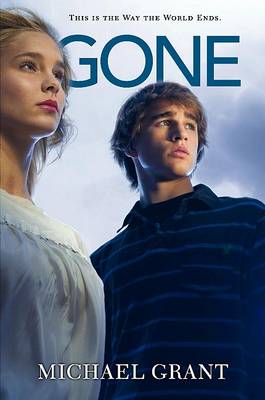Reviewed by Amber (The Literary Phoenix) on
I believe Gone was published in the Golden Age of YA Dystopia, and as such, there was a lot to compete against. Books like The Hunger Games and Divergent led the pack with their distant future and changed society narratives. Gone is a bit different in that we experience the moment of the catastrophe, and we stay in that present. There are many questions unrolled through the course of the story, enough to keep anyone curious. As far as world building goes, it reminded me of Left Behind meets a superhero origin story.
The oldest characters in Perdito Beach is 14 years old – everyone age 15 and older has “poofed”. The remainder don’t know why it has happened, but it has, and suddenly all these kids are left to their own devices to survive. For some, this means stepping up into new responsibility and growing up fast. For others, it’s about taking control. Characters like Mary and Albert understand that some people have to step up, even if they are only 14. Unfortunately, most of our time is spent on far less noble and interesting characters (in my opinion). Sam and Cain (who is aptly named) are very black and white, selfish and whiny characters. They – and other characters like them – were not inaccurate for their age or situation, but they were not characters I enjoyed. There’s a lot of screaming and whining and frustrated kids in Gone, and should something like this actually happen, I suppose there would be… but they just aren’t so interesting as heroes and villains in fiction.
The pacing was very difficult for me – Gone was one of the few audiobooks I sped up to 2x because I was so frustrated by the speed of both the narrator and snail’s pace at which the story was moving. Outside the narration (which was also jarring because of all the screaming and crying… awkward to listen to), I think there were two aspects that slowed down the pace. Firstly, there were so many POV characters. There where chapters from the perspective of Sam, Astrid, Lana, Cain, Drake, Diana, Albert, Mary, Orc, Jack, Dara and Howard… I think that’s all. There wasn’t a consistent rotation, but 12 POV characters is a lot. Additionally, these characters kept poking at the same things. When we got an answer, the presentation was underwhelming… almost lost between all the other events of the story. Sam’s constant insistence that he is not fit to lead are tired and exasperating. Any time Howard was in the scene, I was thoroughly annoyed.
There were some aspects that I appreciated, but I would like to more depth on them. Health issues, in particular, were interesting to me. We have a character with depression, an eating disorder, and other characters who struggle with addiction. They’re darker subjects for the age of the characters, but also? It is such an appropriate thing to discuss in the situation. There is bound to be at least one child who goes for beer, for example, because there’s nobody to stop him. These little details were interesting to see, because they rarely make it into novels. There was quite a few of them, however, there was not a lot of discussion about them. Just part of the children’s daily life.
I haven’t spoken much on the superpowers – the superpowers were fine. My observation was that the children who mutated had abilities that were consistent with their deepest need. Many developed when the character was afraid, in order to make them able to confront that fear. I was waiting for more and more people to develop these abilities, and that may yet happen. These were relatively well done, and I like that there were consequences to them (the healer becomes exhausted, the runner wears out her shoes).
The story concept is really interesting, though. There are a lot of curiosities – why do only some children mutate and have superpowers? How was the barrier erected (there was a sort of half-hearted scene about it, but I am unsatisfied)? What about their continued survival? I want answers to all these questions, but I also want better character development, and less focus on Sam and Cain if that’s possible. Gone is only the first book in an extended series, so I hope there will be more answer an we’ll get to see more of some other more interesting characters.
Reading updates
- Started reading
- 31 December, 2019: Finished reading
- 31 December, 2019: Reviewed
